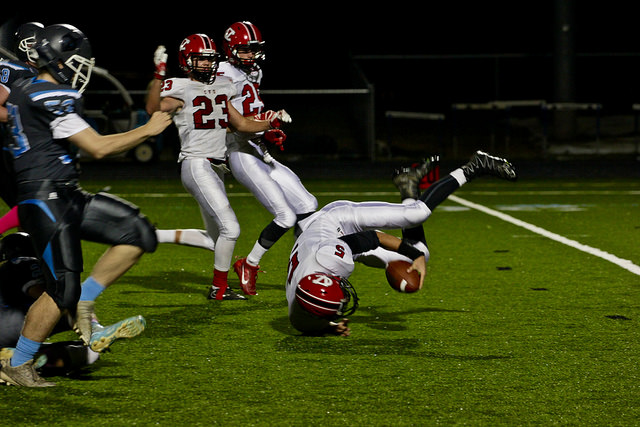Football is arguably the most popular sport in the United States. Americans watch more football on TV than any other sport. This means that many kids sit with their families watching professional and college football every weekend from September until January. These kids may even play (or want to play) football themselves. But as we have begun to learn, football is a dangerous game. Concussions are a real and constant fear. While we do recommend kids with ADHD especially get a healthy dose of risk and danger, some parents are understandably concerned about the physicality of a game like football. But kids don’t get concussions playing fantasy football.
Fantasy football is like Dungeons and Dragons for sports fans. Played on paper in person or online, individuals build their own fantasy teams of real professional football players. The most successful fantasy football players choose their team based on stats and attributes, just like building an adventuring party in a tabletop or video game. Teams receive points based upon their performance on the field. The best thing about playing fantasy football is that rather than potentially damaging kids’ brains, it builds them.
Now I’m not badmouthing football. The mission of LearningWorks for Kids is to transform kids’ play into opportunities for brain development and learning. In addition to striving to make digital play more productive, we strongly encourage parents to implement a healthy Play Diet that includes a large proportion of physical play. Physical play should include competitive sports that have the risk of injury. Our suggestion is not to avoid these sports but to take appropriate precautions. Use up-to-date safety equipment, training coaches in proper techniques, and limiting contact sports for younger children.
But it’s hard to blame the parents who are discouraging their kids from playing football. There has been a significant drop in youth participation over the past decade. Children are choosing to play other sports, the most popular being basketball. Approximately 15% of kids between the ages of 6 and 12 play basketball on a regular basis. This is followed in popularity by baseball/softball at 13%, outdoor soccer at 9%, and tackle football at 3.3%. Interestingly, flag football is close behind tackle football, with 2.6% of kids playing the sport.
Concussions can occur from playing any of these sports. While football is most problematic for serious injuries and concussions, other sports such as ice hockey, lacrosse, and soccer also present significant opportunities for concussions. But the benefits of playing sports, including developing a habit of exercise, becoming part of a team, and the pure joy and pleasure of play, should not be underestimated or ignored.
Not only has there been an outcry over the risks of youth tackle football, but there has also been a recent campaign against kids playing fantasy football. As of 2017, fantasy football (which is the most popular of all of the fantasy sports) is no longer being marketed to children. In the past, sites such as NFL Rush (the official NFL site for kids) and Sports Illustrated for Kids had fantasy sites directed the kids. However, negative feedback which suggested that these sites were related to gambling and primarily a marketing tool to get children to become lifelong NFL fans resulted in them closing.
In contrast to concerns about brain trauma from playing tackle football, there are very good brain-based reasons for kids to play fantasy football and other fantasy sports. Playing with parents, siblings, and friends can help foster many opportunities for collaboration, connection, and fun. Here are some ways that fantasy football builds the brains of kids:
Numbers, numbers, numbers – It’s all about stats. Fantasy football is wonderful for practicing math skills. On the simplest levels, players accumulate points for touchdowns, yards accrued, and other actions. On a more complex level, players need to consider probabilities when drafting players and make line-up decisions based upon past performance.
Flexibility in problem solving – Injuries, disappointments, and changes make up part of the world and are a part of fantasy football. Fantasy players must make adjustment to their line-ups or seek trades to cope with the unpredictable nature of the game.
Reading and studying – Winning a serious league requires as much work as an academic course. Fantasy players who study (read) football news are better able to recognize trends and be aware of actual players who are on the rise.
Short- and long-term planning – Fantasy team owners can and should research players and their statistics before drafting occurs. Fantasy owners should form a list of the players they wish to select along with multiple back-up choices. Selecting a successful team does not just include selecting the star athletes but also planning for others who are less well known.
Do you play a fantasy sport? Have you encouraged your children to play? What other benefits of running a fantasy team have you found? Let us know in the comments below or come talk to us on Facebook.





The post is very useful, I learned a lot from it. Thanks for sharing!